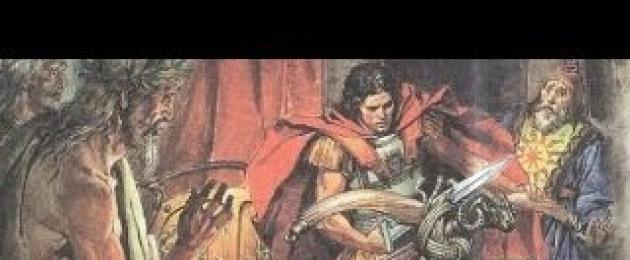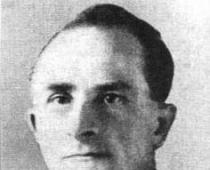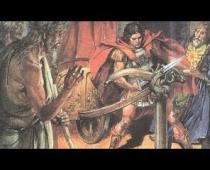Consider ancient Greek phraseological unit "Gordian knot" .
The whole story with this node has some weirdness.
Let's consider the meaning, origin and sources of phraseological units, as well as examples from the works of writers.
The meaning of phraseology
The Gordian Knot is an extremely complicated matter.
Synonyms: intricacy, complex problem
In foreign languages there are direct analogues of the phraseological unit “Gordian knot”:
- Gordian knot (English)
- gordischer Knoten (German)
- nœud gordien (French)
Gordian knot: the origin of phraseological units
As noted, the history of this intricate knot is also strangely intricate. It all starts with the fact that after long civil strife in the kingdom of Phrygia, the oracle announced that the king would be the one whom the Phrygians first met riding on a cart on the road to the temple of Zeus. This man turned out to be the peasant Gordy.
- Gordius himself brought his cart into the temple of Zeus as a gift to the gods for the unexpectedly acquired royal title and tied it with his “signature” knot, which no one managed to untie for many centuries.
- The cart that brought good luck to Gordius was installed by him in the citadel of the capital of Phrygia he founded - the city of Gordion, and was also tied with a complex knot.
- The cart was brought as a gift to Zeus in Gordion by Midas (who was credited with “donkey ears”), the son of Gordius, and he also tied the Gordian knot.
One way or another, the node appeared. It was so skillfully made that one could not even detect its ends.
And this knot would have remained a local curiosity, but the oracle predicted that the one who untied the Gordian knot would become the ruler of Asia. Many have tried, but to no avail. Asia lived quietly.
Until, in 334, young Alexander the Great entered Gordion with his army. Naturally, the ambitious commander could not pass by the promising node, especially since he was busy with the conquest of Asia at that time.
But even here there are different versions of events:
- According to the most common version, Alexander simply took and cut the knot with his sword (where the phraseology “cut the Gordian knot” came from).
- According to another version, in accordance with the story of Aristobulus, “Alexander easily managed to solve the problem and free the yoke by removing a hook from the front end of the drawbar - the so-called “gestor”, which secures the jugular belt.”
Whatever it really was, the version with a sword ultimately became more spectacular and suitable for a great warrior.
What looks most strange in this whole story? It is believed that the knot was made from dogwood bast. How long did he have to wait for the sword of Alexander the Great? From the middle of the 8th century BC. (during the reign of King Gordius I) more than a thousand years passed until 334 AD. It is highly doubtful whether a dogwood bast knot could have survived for so long.
Sources
The story of the Gordian knot is narrated in the works of Roman authors Quintus Curtius Rufus, Mark Junianus Justin, Plutarch, and others.
Examples from the works of writers
It's also easy to remove,
Like a Gordian knot it is difficult to unravel. (W. Shakespeare, “Cymbeline”)
Parted... Some kind of Gordian knot got tight - I had to cut it, but it hurt! (I.S. Turgenev, “Rudin”)
When the bell tower struck seven and only one star remained in the pinkish sky, lonely and clear, and some ship, having set sail, sounded an inconsolable farewell whistle, I felt the Gordian knot on my throat of all those Loves that could have happened, but did not happen. (G.G. Marquez, “Remembering My Sad Whores”)
A knot that cannot be untied
Phraseologism "Gordian knot" means a situation when a certain problem or task is so complex that a non-standard, original approach is required to solve it.
The history of the origin of the phraseological unit Gordian Knot
There is an ancient legend about how the great commander Alexander the Great eliminated such a difficulty with one swing of his sword. It all started with the fact that the priests of the Temple of Zeus publicly announced that the new Phrygian king, who would distinguish himself with the most brilliant achievements, would be the first person to enter the city. This lucky man turned out to be a simple peasant named Gordius. Having become the ruler of the Phrygian kingdom, Gordius made a memorable gift to the temple - his cart, on which he arrived on that memorable day. But he didn’t just give her as a gift, he tied her to the altar so complex and tangled knot
No one, not even the most dexterous and strong craftsmen, could untie it in order to remove the cart from the altar.
And then the Phrygian Oracle made a new prophetic statement: the whole world will submit to the person who decides tangled Gordian knot problem. He will create the greatest empire, incomparable in its power, which will include all of Asia, and the glory of that ruler will go down the centuries.
After some time, the capital of Phrygia was conquered by the army of the young conqueror Alexander the Great. Entering the temple, he looked for a long time tangled knot from thin dogwood bast. Realizing that he would not be able to untie him, just like other people who wanted to, he came up with an easy but unique solution. He took out his sword and, in front of the eyes of his soldiers and temple priests, in one fell swoop he cut the bast knot, over which the artists who wanted to become famous had struggled for so long. The Macedonians praised their leader, and the Phrygian servants of Zeus proclaimed the Macedonian the very great emperor about whom the Oracle told them.
This is how the difficult task, famous throughout Phrygia, and then throughout the world, was solved. As the commander himself said then, if impossible to untie, then you need to cut it apart, that is, approach the problem not like other people, but look at it from a new angle.
If the situation is so complex that it does not lend itself to traditional methods of getting out of it, and something needs to be done about it, all that remains is to strike the problem with the sword of bold, extraordinary measures. Getting out of a complex and seemingly hopeless difficulty with the help of some original and new solution is called “ cut the Gordian knot».
According to legend, there really was a knot that could not be untangled.
And the legend goes like this:

Once the priests of the Phrygian temple of Zeus made the following prediction: whoever sets foot first outside the gates of the city must become a ruler, and he will be the king of kings.
The unsuspecting and unknown poor man Gordius rode into the city on his cart and was recognized as the king of Phrygia.
The cart was presented as a gift to the temple in which the prediction was made and tied to the altar.
But this knot was so intricate and cunning that no one could cope with it.
And then a second prediction arose that the one who unties this knot will become an even more powerful ruler and conquer the whole world.
And then one day, the great Macedonian found himself in front of a knot and everyone froze in anticipation of whether the knot would submit to him or not, how he would untie it. And looking at the tangled bast, Alexander pulled out his sword and cut it.
Expression value:

The phraseological unit “Gordian Knot” is a description of a confusing situation that is difficult to understand. And the more you solve it, the more confused it becomes.
But “cutting the Gordian knot” means resolving the situation in one fell swoop, and approaching it in a non-standard way.
Do you know what we are talking about?
The history of many phraseological units originates in the distant past, and, as a rule, is associated with a series of legendary events and mythical characters. In the Educational section we will find out who tied the Gordian knot and why, the meaning of the term and who managed to cut it.
To find an explanation of the origin of this phrase, let us turn to ancient ancient mythology. A long time ago, even before our era, in a majestic state called Phrygia, located on the territory of Asia Minor, a misfortune happened. Due to a series of military conflicts, the once powerful and prosperous country lost its ruler. The Phrygian people, tired of civil strife, had no choice but to turn to the priest-diviner for help. The oracle's visions said that anarchy in the state would soon come to an end. A new king will ascend to the throne, who will stop the bloodshed in Phrygia. The first person to ride an open chariot into the vicinity of the capital was prophesied by the priest to become a ruler.
Where does the phraseological unit “Gordian Knot” come from?
A lucky chance befell the ordinary farmer Gordius, whom the jubilant Phrygian people considered the newly-made king. A villager who unexpectedly came to power presented the pagan gods with a gift - that same cart. Its king placed it in the center of the city of Gordion, which he named in his honor. The newly-minted ruler tied the yoke of the chariot with a very complex knot, which was so tangled that no one could untie it. Immediately a new prophecy appeared, promising to become the ruler not only of the Phrygian kingdom, but of all of Asia, a craftsman capable of unraveling the cunning weave.
Thus, the meaning of the expression “Gordian Knot” is associated with the enthronement of a simple farmer, who, in order to maintain power in his hands, came up with a kind of puzzle. And this phrase can be interpreted as an extremely complex, problematic situation that cannot be solved by standard methods.

Phrygia on the map of Asia Minor. Times of Antiquity.
Not a single sage, in pursuit of illusory power, failed. The Gordian knot became a real obstacle for adventurers on the way to the desired throne. It took several centuries to solve this difficult, intricate problem. And, as it turned out, her solution lay on the surface, but no one could guess what needed to be done for this.
In the third century BC, when only one city of Gordion remained from the once powerful Phrygian kingdom, the Emperor of Macedonia Alexander the Great, during a campaign against the Persians, accidentally came across the old cart of Gordius on the way. Macedonian, having heard the ancient legend, tried to solve the problem with an elementary, and at the same time, extraordinary method. The great commander did not waste time unraveling the knot; he simply cut it with a sword. According to the Oracle's prediction, the priests of the Temple of Zeus proclaimed Alexander the Great the great conqueror of all eastern lands.

Bust of Alexander III the Great (323 - 356 BC)
Since then, for an original solution to complex, confusing circumstances, they have used the stable phrase “Cutting the Gordian Knot.”
According to researchers, this beautiful story is just folk fiction. No reliable facts about Gordiya’s incident with the cart were found in the sources. Many historical artifacts found during excavations of ancient settlements on the territory of modern Turkey indicate the existence of the Phrygian state.
The origins of the phraseological unit “Gordian knot” should be sought in ancient times. A little background.
At the end of the second millennium BC. The Phrygian kingdom was founded in western Asia (present-day Turkey). Agriculture and cattle breeding were well developed in the state, and crafts and folk art were actively developing. Thanks to a wise foreign policy and successful wars, Phrygia became one of the most powerful and prosperous states of that time.
The capital of Phrygia was the city of Gordion. He will become the center of our history. In the ninth century BC. Gordion was overwhelmed by a wave of internecine wars, and the kingdom was left without a ruler. According to legend, the Phrygians turned to the priests of the Temple of Zeus for advice on who to elect as king. The temple oracle said that the new king would be the first person to enter the city on a cart. The ordinary farmer Gordius turned out to be such a lucky person. Having become the new ruler of Phrygia, Gordius, as a sign of deep gratitude, presented Zeus with his cart, which was installed near the temple. The knot with which Gordius tied the yoke of the cart was so intricate and complex that the Oracle of the Temple made another prediction: the person who unravels the “Gordian Knot” will become the ruler of the entire East.
For many centuries, no one managed to solve the problem of the “Gordian Knot” until 333 BC. Phrygia was not conquered by the greatest commander Alexander the Great (July 20 (21), 356 - June 10, 323 BC). Of course, Alexander heard about the legendary “Gordian knot” and, as an inquisitive person, did not fail to visit the ancient temple of Zeus. Approaching the cart, he looked for some time at the knot made of dogwood bast. Realizing that he was unlikely to be able to untie this tricky knot, Macedonsky pulled out his sword and cut it with one blow. The Phrygian priests praised Alexander the Great and named him the same conqueror of the East that the Oracle predicted. This famous “puzzle” was solved in this simple way.
If the task at hand seems unsolvable, then a possible solution should be sought in an original and non-standard approach, so to speak, look at the problem from the “other side”.
By the expression “cutting the Gordian knot” we mean a way out of a difficult situation, taking a new and bold step in resolving a complicated issue.
- In contact with 0
- Google+ 0
- OK 0
- Facebook 0








